West Campus Ambassadors Program Makes Neighborhood Cleaner and Safer
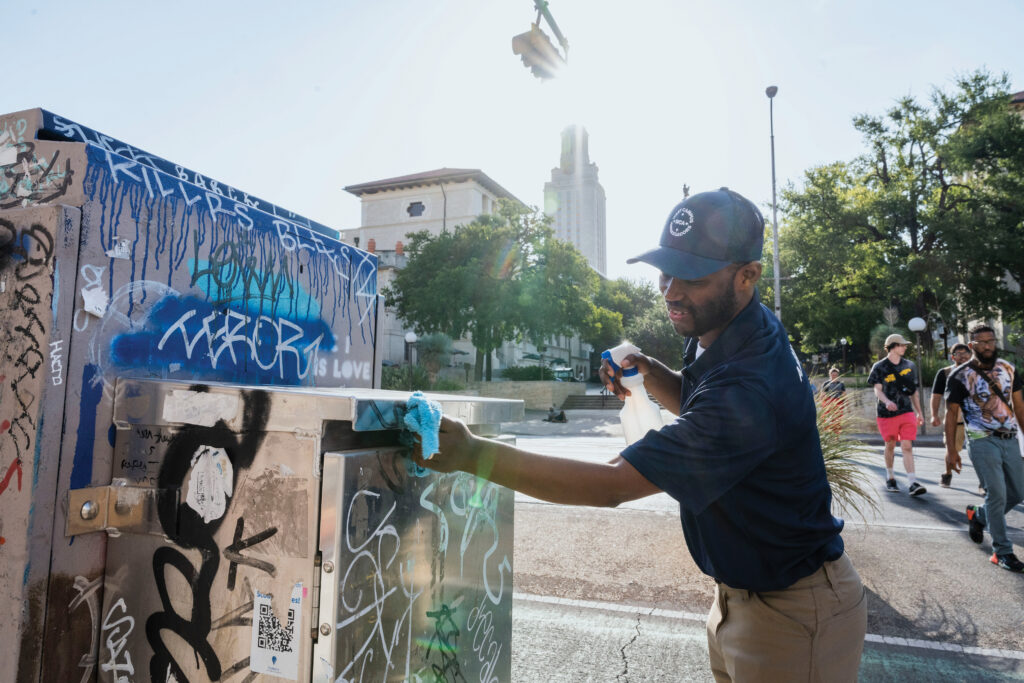
For decades, West Campus has been the place most UT students call home. Right next to the main campus, stretching from Martin Luther King Jr. Boulevard to 29th Street and enclosed by Guadulupe Street on the east and North Lamar Boulevard on the west, the neighborhood has been the backdrop for the entire gamut of student life. Lively with parties, restaurants, and bars, the area is home to tens of thousands of students living on their own for the first time.
While this bustling energy has endured over the years, there is a new version of West Campus—itself growing and changing as the greater city evolves from sleepy Central Texan town to a global hub. Today, walking through the streets of the neighborhood, one can expect to see trash, graffiti, stickers on light posts, unhoused members of the community, and general disarray. Small condominium buildings are torn down to make way for skyscraper apartments, and there’s construction on every major road. It’s not uncommon to receive an investigation alert from the University of Texas Police Department that warns students to avoid a certain street while officers investigate a dangerous situation. UT is aiming to combat these issues more directly with the West Campus Ambassadors program and turn the area into a cleaner, safer neighborhood for the dense population of students who live there.
In 2019, Safehorns—a nonprofit that advocates for better safety regulations on and around UT campus—met with the office of Gov. Greg Abbott, BBA ’81, Life Member, Distinguished Alumnus, to present their many ideas to make campus safer. This is when Joell McNew, Life Member, president and founder of Safehorns, first proposed an ambassadors program for West Campus, but it didn’t stick. Now, four years later, President Jay Hartzell, PhD ’98, Life Member, and the Board of Regents acted on the plan and successfully created the West Campus Ambassadors program in partnership with security and management company Block by Block for a pilot run.
The West Campus Ambassadors—composed of Block by Block employees—have two goals: cleaning up the neighborhood and providing a safe environment for students. During the day, the cleaning team removes biohazards, trash, litter, graffiti, and stickers. Starting at 3:30 p.m., the safety team begins patrolling the neighborhood and is available via text or call to walk students home or address volatile situations.
They also cover two different zones. Zone 1 stretches from Guadalupe Street to Nueces Street, and Zone 2 covers Nueces Street west to North Lamar. Both zones go from Martin Luther King Jr. Boulevard to 29th Street. Cleaning ambassadors work daily in Zone 1 and weekly in Zone 2, while safety ambassadors work daily in both zones.
“Reviving and restoring the West Campus neighborhood is essential,” UT System Board of Regents chairman Kevin Eltife, BBA ’81, Life Member, said in a statement. “We are excited about the future and thank President Hartzell and his team for their leadership and partnership.”
Block by Block, which grew from a private security company dating back to the 1930s, now specializes in providing programs like West Campus Ambassadors to downtown areas and campuses nationwide. Austin already has two other Block by Block programs, one in downtown Austin and one on South Congress.
McNew, who is also the parent of a UT alumnus, says while students and parents see the West Campus neighborhood as an extension of UT campus, the University hasn’t always seen it this way. This disconnect is part of what sparked the idea for an ambassadors program.
McNew says Safehorns looked at many safety plans at peer universities and eventually determined that the University of Southern California’s model was the most successful. USC has “yellowjackets” who work within the student neighborhood resembling UT’s West Campus.
According to Nick Haines, regional vice president of the southwest for Block by Block, all the ambassadors receive monthly training on mental health awareness and de-escalation. They are also trained in biohazard disposal, hospitality, CPR, and interaction with different street populations such as the unhoused or displaced.
Haines says Block by Block also works with organizations such as the Homeless Outreach Street Team (HOST) to help connect unhoused people with whatever resources they may need.
The company also has a detailed data tracking plan where they track all interactions their ambassadors have, whether having a friendly conversation, giving directions, walking someone home, or talking with an unhoused person.
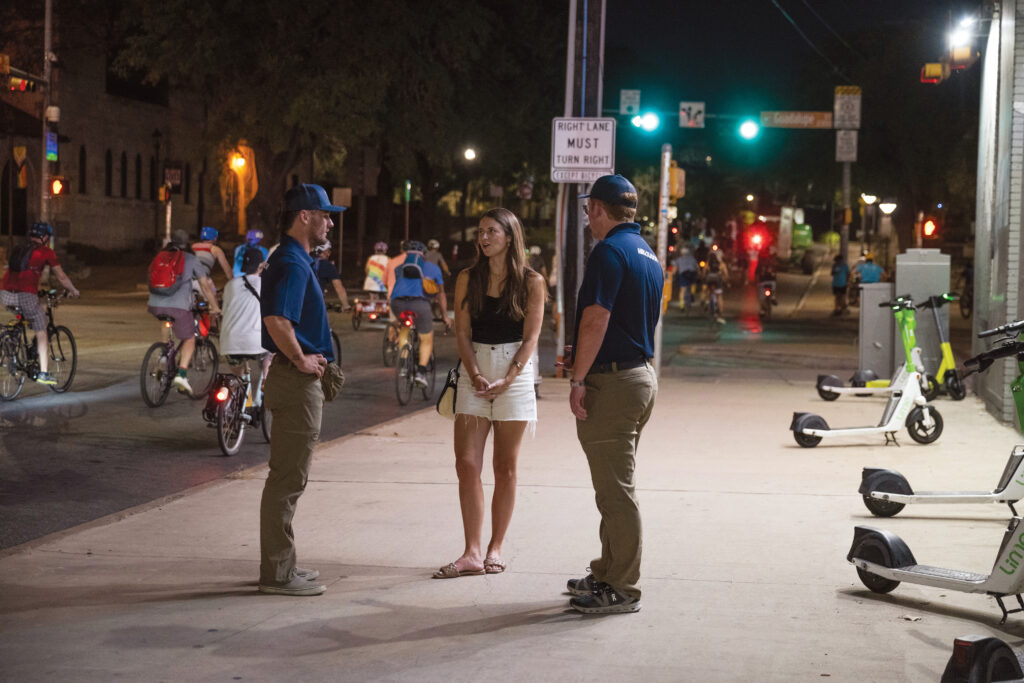
Mechanical engineering junior Rocio Bautista was walking to breakfast one morning in West Campus when three unhoused people started yelling slurs at her. She tried to take a path to avoid them but couldn’t evade the verbal attacks.
Despite the aggression she experienced, Bautista considered herself lucky because she wasn’t physically attacked or harmed in the interaction, and she knew friends who had been.
Bautista says she hopes the program can help fill in the gaps between preexisting programs such as SureWalk and the UT Lyft Night Rides to ensure safe transportation for students, especially at night. She also hopes the program will expand to include more ambassadors so they are more visible and can help cover the large area that is West Campus—the zip code with the highest population density in the city of Austin.
While Bautista says she appreciates the ambassadors picking up trash and cleaning around the neighborhood, she is also sad to see some of the stickers and graffiti go.
“Those stickers represent the students and kind of give [the neighborhood] that college vibe,” Bautista says.
At Safehorns, McNew says while she also appreciates the local color, there must be a balance between condoning free speech and allowing people to yell “offensive, horrible things to girls when they walk by.”
McNew hopes the program will allow community members to “take pride in the community.” Her ultimate goal is to see the program last longer than its pilot.
“What we want is for it to be sustainable because then we all win,” McNew says. “It’s a matter of the positive impact and legacy it gives to our students and future students.”
Recently, McNew received a message that made her cry happy tears. A mother of a UT student reached out and said that her daughter and her daughter’s roommate had been at a fraternity party when her daughter’s roommate wanted to leave but her daughter didn’t. The mom suggested they message the ambassadors, and they did. The ambassadors safely walked the daughter’s roommate home from the party.
Every day, McNew puts on her gold Kendra Scott necklace with the words “walk with me” engraved on the pendant. The phrase reminds her of her son’s classmate, Haruka Weiser, who was sexually assaulted and killed walking home in 2016. Within the year, McNew had created Safehorns to advocate for better safety regulations on and around campus.
“Walk with me if you’re broken. Walk with me because you’re afraid. Walk with me because you need a friend,” McNew says, tearing up. “The legacy that we can leave for [Weiser] is creating a place where we want to walk together, and the ambassadors can help make that happen.”
CREDIT: Courtesy of University Marketing and Communications (2)


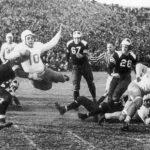



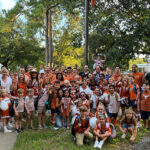



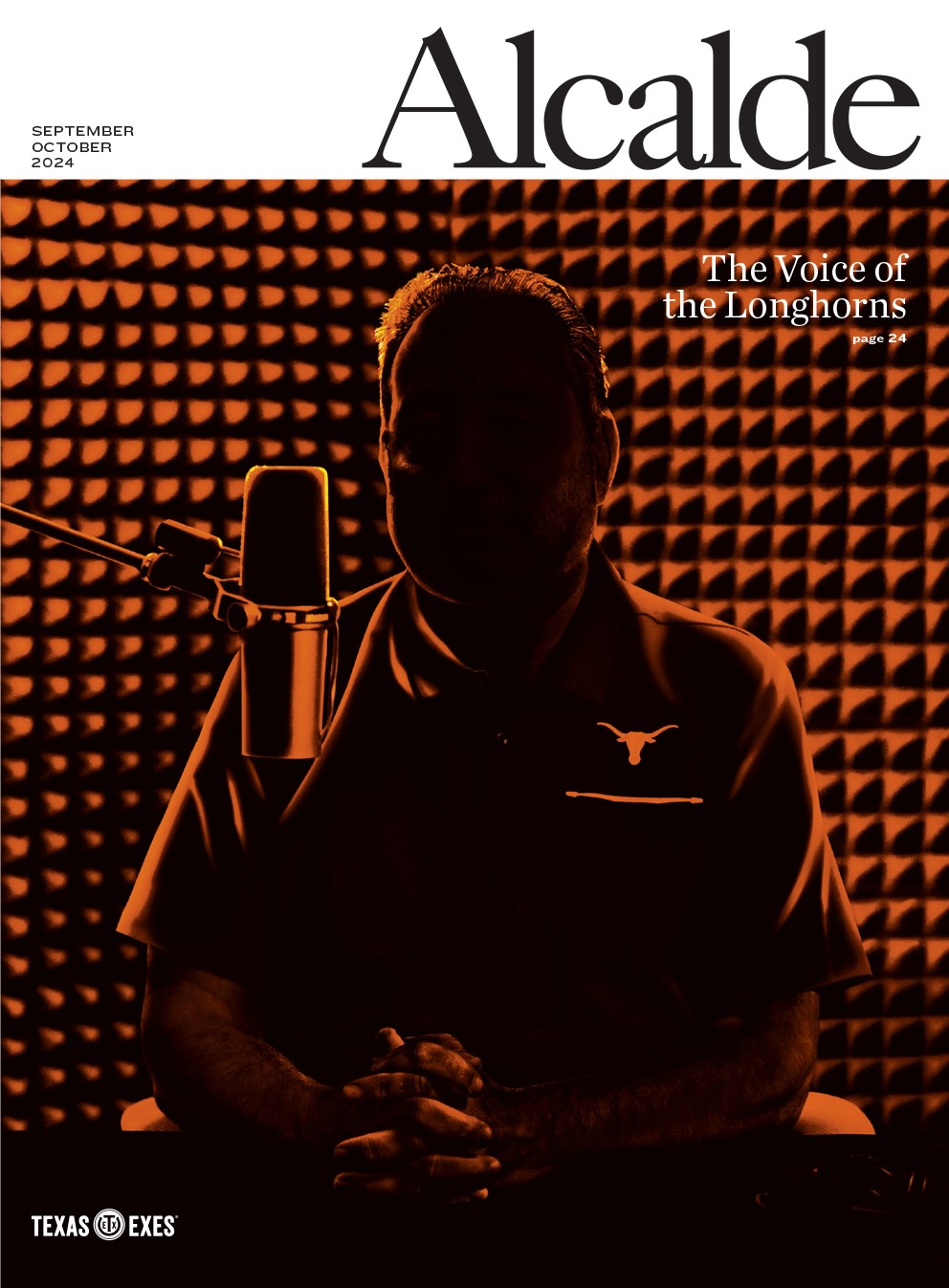



No comments
Be the first one to leave a comment.